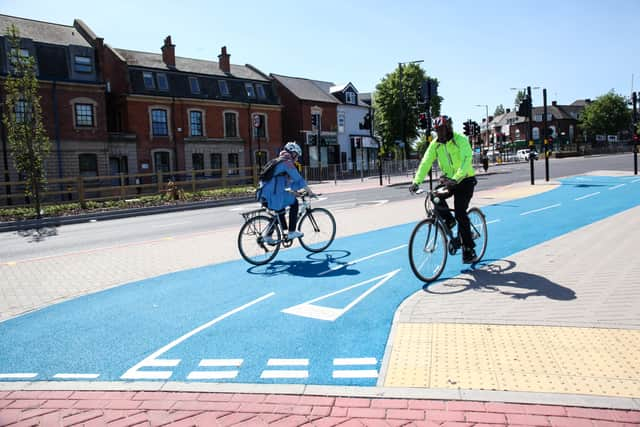Birmingham city centre to become traffic free in radical council transport plan
and live on Freeview channel 276
Radical plans to overhaul transport in Birmingham City Council have been announced amid a bid to cut traffic pollution.
The scheme includes plans to make the city centre largely traffic free - eliminating through traffic - and reducing the use of private cars in out of town neighbourhoods.
Advertisement
Hide AdAdvertisement
Hide AdLow Traffic Neighbourhoods (LTNs) - already in operation in Kings Heath, Moseley, Lozells and Bournville - would cover 30% of Birmingham districts in the proposals. And the road space available for private cars to use across the city would cut by a third.
LTNs proved highly controversial when they were introduced in Kings Heath during the pandemic. And anti LTN protesters heckled IanWard Leader of Birmingham City Council at the summit about the proposals.
The plans are being put forward as part of the city council’s strategy to reduce carbon emissions from transport and reach its net zero goal by 2030.
The plans were being discussed at the Birmingham Transport Summit today (Wednesday, April 26) with council partners and stakeholders to look at how they can be delivered through the Birmingham Transport Plan.
Advertisement
Hide AdAdvertisement
Hide AdThe council said it was committed to four ambitious targets by 2030. These are:
- Introducing low traffic conditions in 1/3 of Birmingham wards by 2030
- Introducing a new parking regime across all public parking
- Eliminating the traffic routing through the city centre
- Reducing by 1/3 the road space that is allocated to private vehicles and allocating it to sustainable modes.


How does the council plan to deliver these targets?
To achieve these targets the city council said it will follow a consistent approach for different types of areas in the city.
Neighbourhoods
In the city’s neighbourhoods it plans to reduce the speed, volume and dominance of vehicular traffic to create Low Traffic Neighbourhoods (LTNs), which it calls “Places for People”. This is where roads are blocked to through traffic to cut down use of private car. Access to public transport is still provided.
City centre
The council wants to deliver a largely traffic-free city centre, with calm and safe streets for pedestrians and cyclists. It says it will achieve this transformation through changing how vehicular traffic moves in and around the city centre, and where parking is available.
Local centres
Advertisement
Hide AdAdvertisement
Hide AdSustainable transport connections are due to be enhanced under the plans as the availability of parking spaces is reduced. And multi-purpose mobility hubs will be introduced.
Details of how these will work has been provided by a city council spokesperson who said: “Along the city’s main corridors we will give priority to sustainable modes of transport, with fast, reliable and safe links across the city and beyond.
“We will do this by taking a corridor-based approach, which reimagines whole routes, moving away from piecemeal mode-based interventions.”


What else has Birmingham City Council said about its radical transport plans?
The council said it acknowledges that its ambitious targets can only be achieved with the support of the public to ensure “a fair approach and genuine participation, deliberation and co-creation amongst all citizen groups”.
Advertisement
Hide AdAdvertisement
Hide AdIt also said that broader changes also need to take place, including: addressing alignment across council policy agendas, leading by example, working in partnership with other government levels, lobbying the central government for more ambition and support and exploring ways to fund our interventions and secure self-sufficiency.


What has Birmingham City Council Transport lead said about the plans?
The council said the Birmingham Transport Plan in turn supports its Our Future City Plan, which promotes economic, social and environmental sustainability.
Cllr Liz Clements, cabinet member for transport at Birmingham City Council, said: “Birmingham is a fantastic place to live, work and visit but we need people to use sustainable modes of transport when travelling – public transport, walking and cycling. In short, we need far fewer cars on the road.
“As a city we have been far too reliant on private cars for far too long and we need to fundamentally change the way we move people and goods around the city.
Advertisement
Hide AdAdvertisement
Hide Ad“We must re-allocate road space so that pedestrians, buses and bikes are prioritised and drastically reduce the number of journeys people make by car. We already have strong foundations to build on, so we can achieve our ambitious net zero carbon emissions target and have a cleaner, greener and healthier city.”
Comment Guidelines
National World encourages reader discussion on our stories. User feedback, insights and back-and-forth exchanges add a rich layer of context to reporting. Please review our Community Guidelines before commenting.
